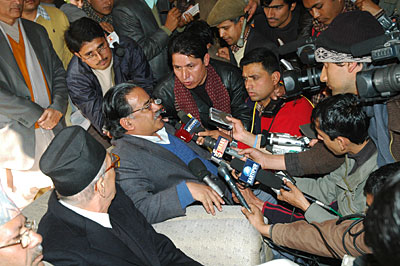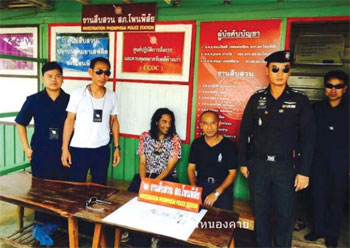For king and country
The advocates of active monarchy need to closely examine why the past year has been a failure.
Originally published on Nepalitimes.com । Despite getting nowhere even one year after advising the king to take over, the advocates of active monarchy in Nepal don’t appear to have learned their lesson. The king’s political action of 4 October 2002, and political inaction in restoring the democratic process as demanded by major political parties, are seriously endangering not only the future of monarchy itself, but also of the country.
If the monarch and the monarchists are under the impression that as long as the ‘general public’ and ‘security agencies’ are loyal, the political parties can do no harm, it is a serious miscalculation.
The ‘general public’ can be divided into two broad groups: active and passive. The silent majority holds opinion, but it is not vocal and organised. The king certainly appears to have more support than any political party in the country from this group.
Hence, the tens of thousands of people who cheered the king during his felicitations in Biratnagar and Dhangadi earlier this year would be largely useless if the monarchy was to come under real threat. They are not going to gather in the streets of Kathmandu to raise slogans in support of the king.
The crowd political parties pulled during their recent agitation may be much smaller, but they are organised, active and vocal. They are at the beck and call of political parties, and have the capacity to create serious disturbances if they wish.
The ‘security agencies’, on the other hand, can only be used up to a point. If the major political parties decide to push for a republican state, it will be virtually impossible for the king to stop them with force, unless there are brutal crackdowns.
The only force that the monarchy can rely on is the politically active masses, but it is here that support seems to be eroding as the present political impasse and insurgency continue. The relevance of the institution of monarchy was never a question within major political parties until a year ago. Now, there is a vertical split on this question in all of them.
This endangers not just the monarchy but also the future of the country. Linking the country’s future with that of the monarchy is not as naïve as it may seem to some people. However badly they may have been performing in the past, we cannot and should not question the relevance of political parties. Similarly, it would be also wrong at this stage to contemplate Nepal as a republic, despite the king’s mis-moves.
To use contemporary political jargon, Nepal is in a state of ‘Complex Political Emergency’—a situation where the state is contested and can collapse if appropriate measures are not taken. In such a situation, intervention (as has happened in many other Third World countries) is inevitable. We were fortunate that we had an institution which, despite all its weaknesses, commanded absolute faith of the security agencies and a large section of the population.
A time may come when the monarchy is rendered redundant. Till that time, however, we need to build institutions which could command faith and earn the trust of the people, discipline unruly politicians and also curb the possibility of ambitious generals following in the footsteps of junta leaders in our neighbourhood. As the army, Maoists and political parties jostle for power, the monarchy is the only institution strong enough to intervene and pull us back from the brink of anarchy and eventual foreign intervention.
However, the paradox is that in the past year, instead of trying to bring things back on track, King Gyanendra has deliberately snubbed the political parties. By doing so he may have impressed some people who thought the political leadership deserved a bloody nose, but he may be undermining his own position. The royal move has brought the monarchy and the king down to the level of all the other political players.
All four kings since King Tribhuban have treated political parties as rivals rather than institutions that needed to be nurtured for the modernisation of the country and the continuation and respect of the institution of monarchy. However, instead of being a matter of concern, the failure of the political parties seems to always have been a matter of joy for the palace.
In this, the Nepali monarchy is still a prisoner of the past. It has also not evolved into an institution with a true social and welfare bent, as has happened in Europe. Those monarchies are transparent and constantly under public scrutiny and pressure to justify their existence. Our monarchy has been conservative, and except for a few environmental and charitable causes, has failed to learn the lessons of modernity. The only justification for the monarchy’s relevance has been its oft-repeated recognition as a symbol of national unity.
But if the monarchy fails to fulfill even that role by contributing to the weakening of political institutions which are essential for modern state-building it will be difficult to justify its existence. The advocates of active monarchy need to think deeply about this.
You can read more of Mishra’s column-essays on his three books, Raajnitisangai Raajkaaj, Khana Pugos Dina Pugos and Bhumadhyarekha. Please go to the BOOKS section to find out more about the books and where to purchase them.



